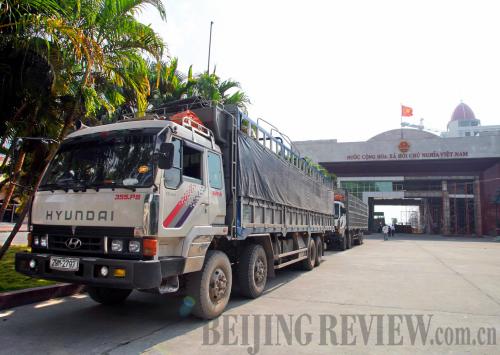|
 |
|
TRADING ACROSS THE BORDER: A loaded truck arrives at the Dongxing land port in Guangxi Zhuang Autonomous Region. Bordering Mongcai, Viet Nam, Dongxing is the country's third largest land port (CFP) |
Hong Kong has swiftly become the world's freest market for the yuan and yuan-denominated products. Hong Kong banks can now open yuan accounts and provide relevant services for local or overseas corporate clients. More than 80 Chinese and overseas institutions have issued yuan-denominated bonds in Hong Kong, including the World Bank, U.S. heavy equipment maker Caterpillar, German automaker Volkswagen and McDonald's Corp.
Data from Hong Kong Monetary Authority showed yuan deposits in the city's banking system surged 76 percent from the beginning of this year to 550 billion yuan ($85.9 billion) at the end of June.
However, while the liquidity pool of yuan funds accumulates outside China, foreign holders of the yuan have few investment options besides low-yielding deposits.
"Allowing the yuan to be used for foreign direct investment should make it easier for companies that sell yuan bonds to move the money to the mainland where it can be put to good use," said the HSBC in a recent report.
It seems that the Chinese Government is ready to build a more transparent and standardized framework for offshore FDI, it added.
"The new policy is expected to remove the bigger barrier hindering growth of the offshore yuan market—a lack of flow-back mechanism," said Ma Jun, a Hong Kong-based economist with the Deutsche Bank.
"We have recently conducted a survey over 44 multinational companies and found that 65 percent of them are interested in using the yuan instead of foreign currency to invest in China," he said.
"Chinese policymakers will first open up channels between the offshore and onshore yuan market, allow market forces to find an equilibrium rate for the yuan on the offshore market, and then influence the onshore market," said Chen Xingdong, chief China economist at BNP Paribus in Beijing.
A milestone
Economists believe the new program is bound to expand the global presence of the Chinese currency and pave the way for its internationalization.
"This is an important step before achieving full convertibility of the yuan," said Zuo Xiaolei, chief economist with the Beijing-based China Galaxy Securities Co. Ltd. "Foreign companies will be more motivated to hold the yuan as they hope to bring the currency back to China where investment opportunities would be plentiful."
Meanwhile, the Chinese Government has pledged to initiate the R-QFII program, under which qualified foreign institutional investors are allowed to buy yuan-denominated securities on the Chinese mainland with an initial quota of 20 billion yuan ($3.125 billion). This move is also expected to provide an additional vehicle for offshore yuan funds to return to China.
"In addition, these moves will help relieve growing pressures of ballooning foreign exchange reserves," said Mei Xinyu, an associate research fellow with the Chinese Academy of International Trade and Economic Cooperation.
"It will boost the yuan's acceptance in Western countries, a major destination of Chinese exports," said Mei. "As a result, Western companies will be more willing to pay yuan for Chinese products, which would reduce dollar capital inflows into China."
Wang Jinbin, a professor with the School of Economics at the Renmin University of China, said China is gradually relaxing controls on its capital accounts to allow the yuan to become an international currency.
"The best situation is the offshore yuan could be widely used in foreign countries, instead of flowing back," he said. "But obviously, the yuan has yet to gain such attractiveness and strength."
Peter Pang, Deputy Executive Director of Hong Kong Monetary Authority, said the new mechanism will deliver a strong boost to Hong Kong's financial industry and add appeal to the yuan-denominated bonds issued in the region.
In 2010, China's FDI amounted to $105.7 billion, with around 57.3 percent coming from Hong Kong. "It will benefit Hong Kong's financial market to a large extent as massive offshore yuan FDI would enter the mainland via Hong Kong," Pang said.
Looming concerns
While economists welcome the return of offshore yuan funds, they have also raised worries about its side effects.
"Massive capital inflows may undermine the stability of China's financial system and capital markets," said Zhang Yansheng, Director of the Institute of Foreign Economics Research under the National Development and Reform Commission. "It is necessary for regulators to strengthen supervision and establish effective defense against international hot money."
"We need to seriously implement measures to ensure that the offshore yuan FDI go into the real economy, instead of speculating in the capital markets," he said.
"Because the interest rates in Hong Kong are lower than that on the mainland, the latter is likely to experience torrential and swift yuan inflows," said Fu Bingtao, a researcher with the Agricultural Bank of China Ltd. "That will add to excess liquidity of the country, fuelling inflationary jitters."
Lu Zhengwei, chief economist at the Industrial Bank Ltd., agreed. "China is supposed to take a step-by-step approach to promoting offshore yuan FDI, and keep a close watch over possible risks for the economy."
The Chinese currency will face greater appreciation pressures as the yuan becomes more acceptable to foreign investors, said Xi Junyang, Deputy Director of the Research Center for Modern Finance at the Shanghai University of Finance and Economics.
"As a result, China needs to keep an appropriate pace of the internationalization of its currency and strike a balance between benefits and risks," he added. | 